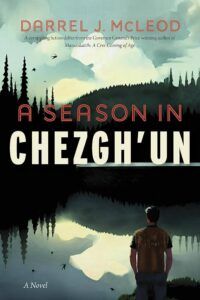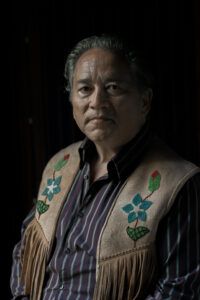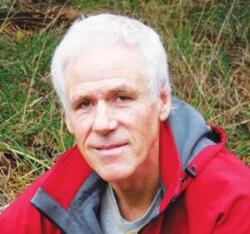Challenging ‘what the white man want’
A Season in Chezgh’un
by Darrel J. McLeod
Madeira Park: Douglas & McIntyre, 2023
$24.95 / 9781771623629
Reviewed by Theo Dombrowski
*

It is a real gift for an author to offer his readers a novel that is both memorable and timely. A Season in Chezgh’un by Sooke’s Darrel McLeod is exactly such a gift, arriving at a period in our history when the multiple, raw issues surrounding Indigenous people of Canada in general, and British Columbia in particular, loom large in the public mind.
When authenticity of voice is crucial, McLeod’s is rock solid. Consider his two previous books. The first, Mamaskatch: A Cree Coming of Age, is a tough, award-winning account of growing up as a Cree in northern Alberta. Its sequel, Peyakow: Reclaiming Cree Dignity, is at least as frank, intense, and rooted in the author’s own life.
This time, though, like many other prominent Indigenous writers, McLeod has chosen fiction rather than nonfiction, thereby tapping into the singular impact of fictional narrative and its distinct ability to affect both mind and emotions. It is impossible to read A Season in Chezgh’un without feeling a privileged participant in an utterly authentic experience.
Some of the ring of truth comes from the way the novel is written. McLeod has chosen a direct, unencumbered style; most (but not all) of the writing almost feels as if it is a journal more than a novel: one event, encounter, or realization leading to the next as the “season” passes. And to reinforce this sense, the author replicates the speech patterns of Chezgh’un’s citizens: “Princip’l, he says you done good here,” declares Art—probably the second most central character in the novel—his idiom like that of many others, pervading the entire novel: “But you haft understan’… you’re workin’ for the white man here, doin’ what the white man want.”
Superficially, the novel is as focused as a laser, limited as it is to a single year, a single man, and his experiences in a tiny “Dalekh” village. Beyond the surface, however, the author has taken on a vast array of issues relevant to the contemporary Indigenous experience.
In addition, he has married to these issues a parallel issue: James, the protagonist, is gay. Importantly, the novel is set during the early days of the HIV pandemic, when the social and physical dangers of being gay were daunting.
The fact that part of McLeod’s training in fiction was with Shyam Selvadurai is not insignificant. Selvadurai’s celebrated novel, Funny Boy, casts a glaring light on the parallel dangers of the protagonist’s identity both as a threatened Tamil in Sri Lanka and as a gay boy. In Selvadurai’s novel, as in McLeod’s, sexual oppression echos social and political oppression.

Into the jaws of this double oppression, the author places a protagonist who could hardly be better shaped to illuminate so much—and so movingly.
First, McLeod makes James wonderfully likeable. Combining courage and qualms, deep emotion and creative intelligence, he is, above all, driven by both ideals and by the capacity for deep affection. Second, his every sensory nerve is dialled to the maximum. He is intensely alive to light and texture, to sounds and smells. An injured moose, through his sensibility, is “ fur—a blend of hickory and sepia”; it is the “powerful smell of wet animal fur and urine.” Every sense on high alert, James is also alive with a sexual energy that thrums between him and several others, both male and female.
Third, and probably most important, this young man’s background (a lot like the author’s own) gives him deep but diverse personal perspectives. As a Cree, he knows what it is to have grown up, imprinted with a distinct Indigenous culture strikingly like but also unlike that of the Dalekh. He also knows what it’s like to have lived in poverty and pain. Crucially, though, he additionally knows what it’s like to be affluent, cushioned from those realities by white, urban friends and lover. Add to these the additional perspective he gains from a visit to an Indigenous Mapuche community in Argentina, and the result is a character with multi-faceted insights into multiple identities.
In order to propel James’ understanding, McLeod has him spend a “season” as a newly hired principal in the village of the title, Chezgh’un, far in north central British Columbia.
The basic pattern of action is familiar, both in novels and movies: idealist educator wades into a hornet’s nest, and after conflict, heartache, and success, emerges both touching others and being touched by them. The very facts, however, that McLeod himself had similar experiences and, in addition, has his protagonist leave comfort in a restless quest to improve the lives of a damaged people makes his quest not just personal, but urgent.
And, as involved as it is with the psyche of its single protagonist, the novel is also a memorably detailed document of a huge cast of secondary characters, both within the community and in adjoining towns—everyone from a gas-sniffing teen to a powerfully charismatic woman elder.
Far from developing the action linearly, McLeod gives vitality to the narrative through immersing his protagonist into a complex mix of cross currents, pulls, and counter pulls. The reader cannot help but cheer on the young man as he takes on one challenge after another—at one point, for example, cancelling regular schooling so that his students can participate in the annual salmon harvest. The vividly detailed description of the event that results from James’ audacious decision provides the reader with a powerful sense of a rich store of cultural practices and propels the novel’s action into a series of similarly audacious experiments (and, in reaction to them glimpses of the opposition, even enemies, James often creates).
Yet the Goliath of negative forces acting on and in the community, many readers may feel, has met a match in this personable and vital David.
Or has he? Both to add to the power of the story and to make sure his readers understand the realities mounted against positive change, McLeod musters a grim army of Philistines. It is true to the conflict of dark and light that at the year’s end, James feels “joy had temporarily displaced pervasive despair.” Yes, there is joy, but James fears it is temporary.
Many of the most destructive forces originate in the white world. If there is a single inimical force in the past, it is the historical practices of past governments in general and of the residential schools in particular.
Even so, as the author—and James—make clear, the past isn’t just the past. It is also the present. It is the present in the form of the scars left in the community, in patterns of abuse and addiction—in the words of one of the survivors, “childhood sexual abuse from some of the women … elders … and political leaders.” And: “the current situations are part of a cycle arising from massive sexual abuse at residential schools….” The suicide of a young man in the village is a painful reminder of the depth of the scars.
Repeatedly, the government is shown to reek of negligence, subverted racism, and complacent parsimony. In his attempts to improve the education of his students, James is constantly angered by appallingly bleak school facilities. But his anger doesn’t stop there:
All the stupid and harmful things the government in Canada had done to Indigenous people began to roll through his mind—banning the potlatch and traditional ceremonies, making it illegal for First Nations to hire lawyers, … sending them to industrial schools and forbidding them to speak their language…. A familiar anger surged from James’s heart into his throat and head—stupid fucking government.
In the words of the band manager when a family burns to death in their own home: “Gor’ment don’ give a shit.”
As McLeod also demonstrates, many of the destructive forces flourish in contemporary broken Aboriginal communities.
One of the most powerful figures in the village, an older woman steeped in the Roman Catholic values of residential schools, challenges his introducing sex education to his students. Even elders who otherwise support him, at one point oppose his letting his students write government exams.
One surprising—but, for many readers, informative—difficulty James has to face arises from a land rights battle between the band in a nearby town and the residents of Chezgh’un. Most frightening, though, is the hostility of select men in the village, especially when they sense his sexuality—at one point sending a young man with hopes of seducing and thereby bringing down the new principal.
The dangers don’t stop there. In fact, one of McLeod’s most compelling narrative strategies throughout the whole novel is to build and sustain a sense of threat, even into the last pages.
Using conflict to heighten the drama of the story, the author has it play out in James’ internal life, drawing his protagonist through veils of joy and satisfaction, but also concern, fear, misgivings, guilt, and anger.
The real culmination of the novel, however, comes as the author writes movingly of the way James fully embraces his identity—both as an Aboriginal and as an Aboriginal who dedicates his life to Aboriginal causes: “Finally, something important had surfaced and sunk in—James knew where he belonged. He belonged with Native people on Native lands.”
And just as important to McLeod’s mission in the novel is for him to reinforce the sense of vitality and positive energy within Indigenous people in a “remarkable land,” with “big pieces of …culture still intact” and, most important, “showing love.” Drawing on the deepest wells of purpose in the novel, the novelist ensures that the readers, like James, are left with a “magical, once in a lifetime soul-connection.”
But this is not the end of the novel. To leave his readers haunted with more than just a story of a single man’s quest, McLeod concludes with an extraordinary, elusively strange encounter.
Switching to the present tense, he gives the narration an almost visionary intensity. Leaving Chezgh’un, James encounters a creature from the wilderness: for many readers, how he reacts with caring to what he sees and how he carries away with him the results of the encounter may be the most memorable impression they take from a memorable novel.
*

Born on Vancouver Island, Theo Dombrowski grew up in Port Alberni and studied at the University of Victoria and later in Nova Scotia and London, England. With a doctorate in English literature, he returned to teach at Royal Roads, the University of Victoria, and finally at Lester Pearson College at Metchosin. He also studied painting and drawing at the Banff School of Fine Arts and at the University of Victoria. Hei lives at Nanoose Bay. Visit his website here. [Editor’s note: Theo Dombrowski has written and illustrated several coastal walking and hiking guides, including Secret Beaches of the Salish Sea (Heritage House, 2012), Seaside Walks of Vancouver Island (Rocky Mountain Books, 2016), and Family Walks and Hikes of Vancouver Island (RMB, 2018, reviewed by Chris Fink-Jensen), as well as When Baby Boomers Retire. He has reviewed books by Max Wyman, Dustin Cole, Deborah Willis, Lindsay Wong, Bill Engleson, Dan Gawthrop, Lyndon Grove, Ihor Holubizky, & Brent Raycroft for BCR.]
*
The British Columbia Review
Interim Editors, 2023-25: Trevor Marc Hughes (non-fiction), Brett Josef Grubisic (fiction)
Publisher: Richard Mackie
Formerly The Ormsby Review, The British Columbia Review is an on-line book review and journal service for BC writers and readers. The Advisory Board now consists of Jean Barman, Wade Davis, Robin Fisher, Barry Gough, Hugh Johnston, Kathy Mezei, Patricia Roy, Maria Tippett, and Graeme Wynn. Provincial Government Patron (since September 2018): Creative BC. Honorary Patron: Yosef Wosk. Scholarly Patron: SFU Graduate Liberal Studies. The British Columbia Review was founded in 2016 by Richard Mackie and Alan Twigg.
“Only connect.” – E.M. Forster
3 comments on “Challenging ‘what the white man want’”